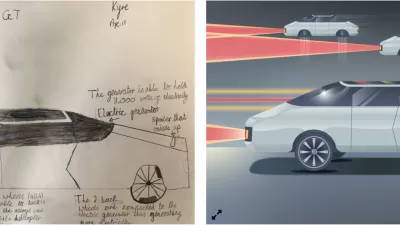AI-generated images are creating new landscapes and cityscapes, capable of inspiring awe or fear.

Planetizen founder Chris Steins recently published a Medium post collecting 20 AI-generated images of cities that push the boundaries of imagination.
For the uninitiated, Steins helpfully provides this description of how AI-generated images work:
An AI image generation service creates images using a machine learning technique called Generative Adversarial Networks (GANs). To create images of cities, the AI is trained on images of cities, and then it can generate new images of a future city based on a prompt — a set of words or phrases provided by the image creator. The AI algorithm uses a feedback loop to improve the images it produces, making them increasingly realistic.
The post, linked below, showcases 20 images, varying from a “Cyberpunk Barcelona” to versions of New York that replace rooftops and streets with trees.
FULL STORY: From Cyberpunk Barcelona to Neo Tokyo: 20 AI-Generated Cities You Have to See

Maui's Vacation Rental Debate Turns Ugly
Verbal attacks, misinformation campaigns and fistfights plague a high-stakes debate to convert thousands of vacation rentals into long-term housing.

Planetizen Federal Action Tracker
A weekly monitor of how Trump’s orders and actions are impacting planners and planning in America.

In Urban Planning, AI Prompting Could be the New Design Thinking
Creativity has long been key to great urban design. What if we see AI as our new creative partner?

King County Supportive Housing Program Offers Hope for Unhoused Residents
The county is taking a ‘Housing First’ approach that prioritizes getting people into housing, then offering wraparound supportive services.

Researchers Use AI to Get Clearer Picture of US Housing
Analysts are using artificial intelligence to supercharge their research by allowing them to comb through data faster. Though these AI tools can be error prone, they save time and housing researchers are optimistic about the future.

Making Shared Micromobility More Inclusive
Cities and shared mobility system operators can do more to include people with disabilities in planning and operations, per a new report.
Urban Design for Planners 1: Software Tools
This six-course series explores essential urban design concepts using open source software and equips planners with the tools they need to participate fully in the urban design process.
Planning for Universal Design
Learn the tools for implementing Universal Design in planning regulations.
planning NEXT
Appalachian Highlands Housing Partners
Mpact (founded as Rail~Volution)
City of Camden Redevelopment Agency
City of Astoria
City of Portland
City of Laramie





























